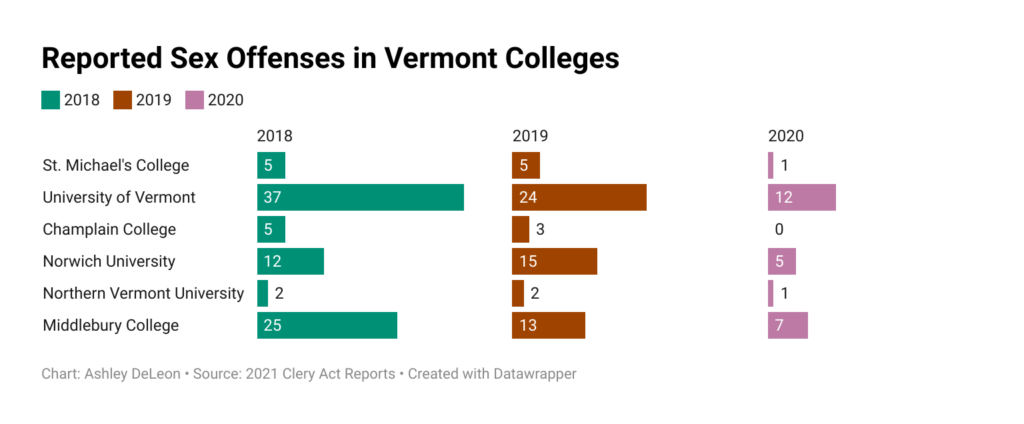By Ashley DeLeon • Executive Editor • adeleon@mail.smcvt.edu
Reported cases of sexual violence at Vermont colleges declined in 2020, new Clery Act reports revealed. College administrators statewide speculate that COVID-19 restrictions and new Title IX regulations may be responsible. Experts add that underreporting has always been a prevalent issue in higher education.
“What we’re missing is actually talking to survivors and hearing their experiences of either what led them to report or not,” said Catherine Welch, assistant dean of students and Title IX coordinator at St. Michael’s College.
The Clery Act requires higher education institutions to report campus crime data, provide support to victims of violence and outline current policies to improve campus safety, according to the Clery Center website.
St. Michael’s reported five cases of sexual violence in 2019 and only one in 2020.
With less socialization on campus due to COVID-19 restrictions, Welch said that people were likely more cognizant of who they were surrounded by.
“There are some hypotheses of students interacting less with a peripheral crowd as opposed to two, three or four really close friends… We didn’t see larger instances of socialization where we have seen sexual violence occur,” she said.
At the University of Vermont, 42 percent of 11,800 students live on campus. The administration reported a combined 24 cases of on and off-campus sexual violence in 2019 and 12 in 2020.
Champlain College reported zero cases of sexual violence in 2020. Communications Director Sandy Yusen said a decreased on-campus student population due to COVID-19 may be responsible.
“Champlain had 42 percent fewer students on our campus last year, so we believe Champlain’s experiences are similar to what we are seeing nationally,” she said.

A study from the National Student Clearinghouse reported that private, non-profit four year institutions experienced a 0.6 percent enrollment decline in Fall 2020. Private, for-profit institutions experienced a 2.1 percent decrease.
The Association of American Universities has not released data on national trends of sexual violence for 2020.
Julia Bernard, vice president for diversity, equity and inclusion at Norwich University echoed Yusen’s statement.
At Norwich, sexual offenses declined from 15 cases in 2019 to five cases in 2020. The institution reported an undergraduate student population of 3,200 people.
“Students at Norwich University were sent home after spring break in Spring 2020, so that accounts for much of the decrease in reporting. In the fall of 2020, there were a lower number of students on campus and strict quarantine/social distancing regulations in place,” she said.
However, Bernard highlighted that recent changes in Title IX regulations, alongside COVID-19 restrictions, made it difficult to decipher whether or not students were unwilling to report and move forward with a complaint.
The U.S. Department of Education released new Title IX regulations on May 6, 2020 under the Trump administration to codify how federally funded institutions must respond to sex discrimination, and integrate “even-handed” justice for the accused.
“The regulation prescribes a transparent grievance process that treats the accused as innocent until proven guilty, requires the school to state a standard of evidence, and requires the school to provide a written decision and rationale,” according to the department website. The rationale is to ensure that institutions do not inflict long-standing harm against students before providing fair and basic procedures.
“I think everyone was concerned that they would have decreased the number of reports,” Bernard said.
She also explained that Norwich shifted all investigations to a virtual setting during the pandemic along with student trainings on sexual violence prevention and reporting. Sexual harassment trainings and virtual discussions about consent and healthy relationships were also offered last spring.
Cases of sexual violence at Northern Vermont University declined from two reported cases in 2019 to one in 2020.
Middlebury College reported seven cases of sexual violence in 2020 compared to 18 in 2019, according to the Middlebury Clery report.
Sarah Robinson, deputy director of the Vermont Network Against Sexual & Domestic Violence, said she is not surprised by current data trends.
“It doesn’t necessarily surprise me that schools are reporting fewer cases. But it would be a mistake to assume that there has been lower prevalence of sexual assault,” she said.
Robinson has been employed at the organization for nearly a decade and was promoted to deputy director in 2018.
“In terms of campus reporting, you know that survivors make really thoughtful decisions about whether that is helpful for their sense of justice and healing,” Robinson said. She also noted a prevalence of survivor anecdotes where needs were allegedly unmet after campus Title IX proceedings or police reports were filed.
“There’s just an incredible amount of work that still remains for all institutions of higher education in Vermont, to ensure that not only that there are robust sexual violence prevention efforts, but also that the response that survivors receive is victim centered,” Robinson said.
For sexual violence resources or support, the HOPE Works hotline is available 24/7 at 802-863-1236.
The data provided from 2021 Clery Act reports can be found on the websites of each college.

